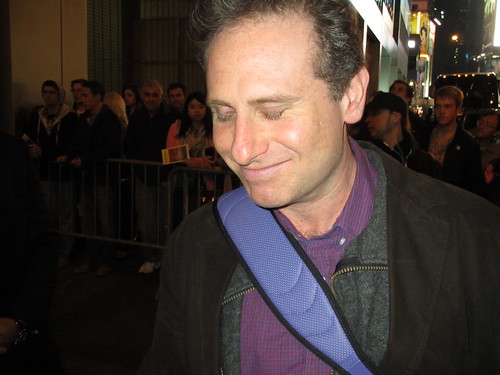The Illustrated Man by Ray Bradbury
American Gods 10th Anniversary Edition by Neil Gaiman (Kindle edition)
The Old Man And The Sea by Ernest Hemingway
To Kill A Mockingbird by Harper Lee
One Flew Over The Cuckoo's Nest by Ken Kesey
Casino Royale by Ian Fleming
The Picture of Dorain Gray by Oscar Wilde
Books Read
J Is For Judgment by Sue Grafton
Blackout by Connie Willis
All Clear by Connie Willis
Books Heard
Man Made by Joel Stein
Girl In A Bar by Rachel Dratz
You're Not Doing It Right by Michael Ian Black
Comments
 Riding out my NaJuReMoNoMo resolution to catch up on my Kinsey Millhone novels, I read the (counting on my fingers) tenth installment J Is For Judgment. In this one, Kinsey is sent to investigate a man who has possibly faked his own death to run off with the proceeds from his rapidly failing real estate investments. This results in a very funny scene with her hopping from balcony to balcony in a Mexican resort hotel. complicating the investigation is the putatively dead man's new mistress and the legal troubles of one of his abandoned sons.
Riding out my NaJuReMoNoMo resolution to catch up on my Kinsey Millhone novels, I read the (counting on my fingers) tenth installment J Is For Judgment. In this one, Kinsey is sent to investigate a man who has possibly faked his own death to run off with the proceeds from his rapidly failing real estate investments. This results in a very funny scene with her hopping from balcony to balcony in a Mexican resort hotel. complicating the investigation is the putatively dead man's new mistress and the legal troubles of one of his abandoned sons.The more interesting story arc in this book is learning of Millhone's long-lost relatives in the area. This gets into some backstory of how she came to be raised by her aunt but never told of the rest of her family.

Blackout/All Clear is a massive two-part novel which takes part in the award-winning time travel series written by Connie Willis. It is World War II and historians have been sent to Blitz in London, the Dunkirk evacuation, and the D-Day preparations. But then things go Horribly Wrong as they tend to do in time travel stories, particularly when told by Willis.
At over 1400 pages, the combined novel is just an enormous doorstop and basically brought my reading to a standstill for several months. The various narrative threads are very hard to keep track of despite the time stamp at the start of each chapter. Since the historians adopt aliases while working undercover, they go by their real names and their cover names adding even more confusion.
The books are clearly the result of meticulous research border on an almost Michneresque level of detail only without the broad scope. The centerpiece of the story involves an air raid which nearly burns down St. Paul's cathedral but this happens about halfway through the story. It is not until the last 200 hundred pages or so that the various subplots start to tie together. And they do all tie together very well but there are still way too many. This book could and should have been cut by at least a third.
 Joel Stein is writer whose journalism, if it can be called that, is something I have laughed at for years. He often self-deprecatingly ridicules his geekiness and lack of masculinity as well as his penchant for pornography. He has rolled all of this up into his book Man Made. In this book-length bit of stunt-journalism he resolves to man-up to be the man he needs to be to father his forthcoming son. To this end, he undergoes basic training, goes hunting, and becomes an ultimate fighter. The book is in parts hilarious but the schtick starts to wear thin soon. There are only so many macho yet sensitive men he can feel inferior to.
Joel Stein is writer whose journalism, if it can be called that, is something I have laughed at for years. He often self-deprecatingly ridicules his geekiness and lack of masculinity as well as his penchant for pornography. He has rolled all of this up into his book Man Made. In this book-length bit of stunt-journalism he resolves to man-up to be the man he needs to be to father his forthcoming son. To this end, he undergoes basic training, goes hunting, and becomes an ultimate fighter. The book is in parts hilarious but the schtick starts to wear thin soon. There are only so many macho yet sensitive men he can feel inferior to.And as a piece of stunt-journalism, a genre which has come increasingly popular, it is particularly unfocused. There seems to be no real deadline or goal. The narrative goes on well past the birth of his son and just devolves into random events. Sometimes extremely funny writers have a hard time keeping the laughs going over long pieces and this is one such case.
 Rachel Dratch was one of the more overlooked and typecast Saturday Night Live regulars. The most notable point on her post-SNL career is being cut from 30 Rock early in the first season. She dispatches her version of the story very early in Girl Walks Into A Bar... and she seems genuinely unbitter over it. The first half of the book is typical comedian biography (I am becoming a little too familiar with this genre) but then the story picks-up. As a 40-something single woman she finds herself unexpectedly pregnant. How she copes with this extremely life changing event is both funny and touching.
Rachel Dratch was one of the more overlooked and typecast Saturday Night Live regulars. The most notable point on her post-SNL career is being cut from 30 Rock early in the first season. She dispatches her version of the story very early in Girl Walks Into A Bar... and she seems genuinely unbitter over it. The first half of the book is typical comedian biography (I am becoming a little too familiar with this genre) but then the story picks-up. As a 40-something single woman she finds herself unexpectedly pregnant. How she copes with this extremely life changing event is both funny and touching.I've mentioned before that I prefer comedians read their own books and this one is a great example of why. The way she makes the word "Universe" ring every time she goes into Oprah-esque mysticism adds just the right touch. If you've loved Tina Fey's Bossypants reviewed here), this is the near-perfect companion book.
Another entry in the very crowded field of audiobooks written and read by comedians is You're Not Doing It Right by Michael Ian Black. Like Bill Engvall (reviewed here), the major event in his life seems to be meeting and marrying his wife. Unlike Engvall, this book is a little more idiosyncratic and the self-deprecation (an important common element in all books by comedians) is more honest and revealing. He really is a dick a lot of times.
Some of the stories are just hilarious. He and his wife getting stoned in a Amsterdam coffee shop is pants-splittingly funny. Unfortunately, a lot of his stories follow a fairly defined formula. He says "I would never do {blank}." And then a few sentences later he says "I did {blank}." It's funny the first several times but then it gets tiresome. And like the memoir by Mindy Kaling (reviewed here), he never seems to have encountered any real career setbacks to speak of.
There is a very serious section about how he deals with depression which is just raw. He gets a lot of credit for honesty but the execution is just a little weak.




















